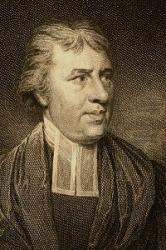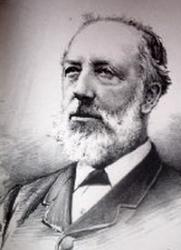Planning worship?
Check out our sister site, ZeteoSearch.org,
for 20+ additional resources related to your search.
- |
User Links
Person Results
Henry Thomas Smart

1813 - 1879 Person Name: Henry Smart Composer of "HEATHLANDS" in The Book of Common Praise Henry Smart (b. Marylebone, London, England, 1813; d. Hampstead, London, 1879), a capable composer of church music who wrote some very fine hymn tunes (REGENT SQUARE, 354, is the best-known).
Smart gave up a career in the legal profession for one in music. Although largely self taught, he became proficient in organ playing and composition, and he was a music teacher and critic. Organist in a number of London churches, including St. Luke's, Old Street (1844-1864), and St. Pancras (1864-1869), Smart was famous for his extemporizations and for his accompaniment of congregational singing. He became completely blind at the age of fifty-two, but his remarkable memory enabled him to continue playing the organ. Fascinated by organs as a youth, Smart designed organs for important places such as St. Andrew Hall in Glasgow and the Town Hall in Leeds. He composed an opera, oratorios, part-songs, some instrumental music, and many hymn tunes, as well as a large number of works for organ and choir. He edited the Choralebook (1858), the English Presbyterian Psalms and Hymns for Divine Worship (1867), and the Scottish Presbyterian Hymnal (1875). Some of his hymn tunes were first published in Hymns Ancient and Modern (1861).
Bert Polman
Henry Thomas Smart
John Bacchus Dykes

1823 - 1876 Composer of "GLASTONBURY" in The American Hymnal for Chapel Service As a young child John Bacchus Dykes (b. Kingston-upon-Hull' England, 1823; d. Ticehurst, Sussex, England, 1876) took violin and piano lessons. At the age of ten he became the organist of St. John's in Hull, where his grandfather was vicar. After receiving a classics degree from St. Catherine College, Cambridge, England, he was ordained in the Church of England in 1847. In 1849 he became the precentor and choir director at Durham Cathedral, where he introduced reforms in the choir by insisting on consistent attendance, increasing rehearsals, and initiating music festivals. He served the parish of St. Oswald in Durham from 1862 until the year of his death. To the chagrin of his bishop, Dykes favored the high church practices associated with the Oxford Movement (choir robes, incense, and the like). A number of his three hundred hymn tunes are still respected as durable examples of Victorian hymnody. Most of his tunes were first published in Chope's Congregational Hymn and Tune Book (1857) and in early editions of the famous British hymnal, Hymns Ancient and Modern.
Bert Polman
John Bacchus Dykes
William Bright

1824 - 1901 Person Name: W. Bright Author of "Morning" in The Fellowship Hymn Book Bright, William, D.D., born at Doncaster, Dec. 14, 1824, and educated at University College, Oxford, where he graduated B.A. (first class in Lit. Hum.) in 1846, M.A. in 1849. In 1847 he was Johnson's Theological Scholar: and in 1848 he also obtained the Ellerton Theological Essay prize. He was elected Fellow in 1847, and subsequently became Tutor of his College. Taking Holy Orders in 1848, he was for some time Tutor at Trinity College, Glenalmond; but in 1859 he returned to Oxford, and in 1868 became Regius Professor of Ecclesiastical History and Canon of Christ Church. His publications include:—
(1) Ancient Collects, selected from various Rituals, 1857, 2nd ed., 1862; (2) History of the Church from the Edict of Milan to the Council of Chalcedon, 1860; (3) Sermons of St. Leo the Great on the Incarnation, translated with notes, 1862; (4) Faith and Life, 1864-66; (5) Chapters of Early English Church History, 1877; (6) Private Prayers for a Week; (7) Family Prayers for a Week; (8) Notes on the Canons of the First tour Councils. He has also edited (9) Eusebius' Ecclesiastical History, 1872; (10) St. Athanasius's Oration against the Arians, &c, 1873; (11) Socrates' Ecclesiastical Hist.; (12) with the Rev. P. G. Medd, Latin Version of the Prayer Book, 1865-69. His poetical works are, (13) Athanasius and other Poems, by a Fellow of a College, 1858; and (14) Hymns & Other Poems, 1866; revised and enlarged, 1874. The last two works contain original hymns and translations. To the hymn-books he is known through his original compositions, seven of which are given in the revised edition of Hymns Ancient & Modern and some are found elsewhere. In addition to “And now the wants are told," and "At Thy feet, O Christ, we lay" (q.v.), there are:—
1. And now, 0 Father, mindful of the love. Holy Communion. Published in Hymns Ancient & Modern1875. Part of a composition in his Hymns, &c.
2. Behold us, Lord, before Thee met. Confirmation. Printed in the Monthly Packet, Nov. 1867, and, in a revised form, in the Appendix to Hymns Ancient & Modern, 1868.
3. How oft, O Lord, Thy face hath shone. St. Thomas. Published in Hymns Ancient & Modern, 1875.
4. Once, only once, and once for all. Holy Communion. Written in 1865, and published in his Hymns, &c, 1866, in 6 stanzas of 4 lines. It was given in the Appendix to Hymns Ancient & Modern, 1868; the new edition, 1875, and several other collections.
5. We know Thee, Who Thou art. Prayer after Pardon. Written in 1865, and published in his Hymns , &c, 1866, in 5 stanzas of 4 lines. It was included in the Appendix to Hymns Ancient & Modern, 1868, &c.
Canon Bright's hymns merit greater attention than they have received at the hands of compilers. He died March 6, 1901.
-- John Julian, Dictionary of Hymnology (1907)
===================
Bright, William, p. 182, i. Other hymns in common use are:—
1. God the Father, God the Son. Litany of the Resurrection. Second stanza, "Risen Lord, victorious King." From Iona, &c, 1886.
2. Pie sat to watch o'er customs paid. St. Matthew. In the 1889 Supplemental Hymns to Hymns Ancient & Modern.
3. Holy Name of Jesus. Name of Jesus. From Iona, &c., 1886.
4. Now at the night's return we raise. Evening. Rugby School Hymn Book, 1876, and others.
5. Thou the Christ for ever one. Mission to the Jews. In the 1889 Supplemental Hymns to Hymns Ancient & Modern.
--John Julian, Dictionary of Hymnology, Appendix, Part II (1907)
William Bright
Samuel Sebastian Wesley

1810 - 1876 Person Name: Samuel Sebastian Wesley (1810-1876) Composer of "HOUGHTON" in The Oxford Hymn Book Samuel Sebastian Wesley (b. London, England, 1810; d. Gloucester, England, 1876) was an English organist and composer. The grandson of Charles Wesley, he was born in London, and sang in the choir of the Chapel Royal as a boy. He learned composition and organ from his father, Samuel, completed a doctorate in music at Oxford, and composed for piano, organ, and choir. He was organist at Hereford Cathedral (1832-1835), Exeter Cathedral (1835-1842), Leeds Parish Church (1842-1849), Winchester Cathedral (1849-1865), and Gloucester Cathedral (1865-1876). Wesley strove to improve the standards of church music and the status of church musicians; his observations and plans for reform were published as A Few Words on Cathedral Music and the Music System of the Church (1849). He was the musical editor of Charles Kemble's A Selection of Psalms and Hymns (1864) and of the Wellburn Appendix of Original Hymns and Tunes (1875) but is best known as the compiler of The European Psalmist (1872), in which some 130 of the 733 hymn tunes were written by him.
Bert Polman
Samuel Sebastian Wesley
William Henry Monk

1823 - 1889 Person Name: William Henry Monk (1823-1889) Composer of "BARMOUTH" in The Institute Hymnal William H. Monk (b. Brompton, London, England, 1823; d. London, 1889) is best known for his music editing of Hymns Ancient and Modern (1861, 1868; 1875, and 1889 editions). He also adapted music from plainsong and added accompaniments for Introits for Use Throughout the Year, a book issued with that famous hymnal. Beginning in his teenage years, Monk held a number of musical positions. He became choirmaster at King's College in London in 1847 and was organist and choirmaster at St. Matthias, Stoke Newington, from 1852 to 1889, where he was influenced by the Oxford Movement. At St. Matthias, Monk also began daily choral services with the choir leading the congregation in music chosen according to the church year, including psalms chanted to plainsong. He composed over fifty hymn tunes and edited The Scottish Hymnal (1872 edition) and Wordsworth's Hymns for the Holy Year (1862) as well as the periodical Parish Choir (1840-1851).
Bert Polman
William Henry Monk
Johann Gottlob Werner
1777 - 1822 Person Name: Johann G. Werner Composer of "RATISBON" in Hymns of the Kingdom of God b. Oct. 4, 1777, Hayn be Borna, Sachsen, d. July 19, 1822, Chemnitz; German organist, teacher and composer
Johann Gottlob Werner
Johann Georg Ebeling

1637 - 1676 Person Name: Johann Georg Ebeling, 1637 - 76 Composer of "VOLLER WUNDER" in Service Book and Hymnal of the Lutheran Church in America Johann George Ebeling Germany 1637-1676. Born at Luneburg, Germany, he studied theology at the University of Helmstedt. He was a composer, author, editor, and collector of music. In 1660 he became head of the Hamburg Collegium, and in 1662 cantor of St. Nicholas Church in Berlin. In 1667 he begam teaching music and Greek in Stettin. He wrote choruses, chorales, cantatas, instrumentals oratorios, requiems and music for over 100 lyrics of Paul Gerhardt. He also wrote about music history. 278 works. He died in Stettin.
John Perry
Johann Georg Ebeling
R. Cecil

1748 - 1810 Person Name: R. Cecil, 1748-1810 Composer of "ST. JOHN" in The Methodist Hymn-Book with Tunes Cecil, Richard, M.A., born in London, Nov. 8, 1748, and educated at Queen's Coll., Oxford. Ordained deacon in 1776, and priest in 1777. He became the Vicar of two churches near Lewes shortly after; chaplain of St. John's Chapel, Bedford Row, London, 1780; and Vicar of Chobham and Bisley, 1800. He died in 1810. His poem:—
Cease here longer to detain me. Desiring Heaven. In 9 stanzas of 4 lines, is supposed to be addressed by a dying infant to his mother. It was written for his wife on the death of a child “only one month old, being removed at daybreak, whose countenance at the time of departure was most heavenly." It was first published in Mrs. Cecil's Memoir of him, prefixed to his Remains, 1811, and is headed “Let me go, for the day breaketh." In the American hymn-books it is usually abbreviated, as in the Plymouth Collection, 1855, and others. [William T. Brooke]
--John Julian, Dictionary of Hymnology (1907)
R. Cecil
Alexander S. Cooper
1835 - 1900 Person Name: A. S. Cooper Composer of "[At Thy feet, O Christ, we lay]" in The Westminster Abbey Hymn-Book
Alexander S. Cooper
Walter Cecil Macfarren

1826 - 1905 Person Name: Walter Cecil Macfarren, 1826 - 1905 Composer of "BARMOUTH" in Service Book and Hymnal of the Lutheran Church in America Walter Cecil Macfarren, b. London, 1826
Evangelical Lutheran Hymnal, 1908
=================
Born: August 28, 1826, Westminster, London, England.
Died: September 2, 1905, at home in St. Pancras, London, England.
Buried: St. Pancras Cemetery, East Finchley, London, England.
Brother of George Macfarren, Walter served as a chorister in Westminster Abbey (1836-41). He entered the Royal Academy of Music in 1842 and was a professor of piano there (1846-1903). He composed pieces for piano, voice and piano, and vocal ensemble, and for many years was a music critic for The Queen.
Sources:
Frost, p. 681
http://www.hymntime.com/tch/bio/m/a/c/macfarren_wc.htm
==================
http://en.wikisource.org/wiki/Macfarren,_Walter_Cecil_%28DNB12%29
Walter Cecil Macfarren


 My Starred Hymns
My Starred Hymns


